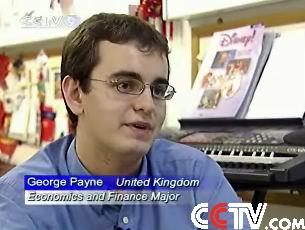Source: CCTV.com
06-21-2007 17:46
Special Report: HK 10 Years"Hello! My name is Cicely Arthur."
"My name is Andy.
"My name is Hendrick."
"Hi, my name is Megan Jackson."
"My name is Emily Myers."
"Hello everyone I'm Chris."
"I'm from Canada."
"I'm from Sweden."
"I'm an exchange student from Germany."
"I am a JD student from the U.S."
"I'm from California."
"I'm an exchange student from Belgium. I'm here to do my PhD in Chinese culture."
The last few years one of the biggest changes in Hong Kong has taken place on campus – at the city's universities. Not long ago Hong Kong local residents filled these classrooms and dormitories. Now these schools are attracting greater numbers of students from around the world. In this half hour we'll talk with several students about how this is changing campus life.
 |
George Payne is a 2nd year student majoring in economics and finance at the University of Hong Kong. George came here for the first time at the age of 17 to attend an international school. After finishing high school here, he went back to England for college. But one year later, George returned to finish his degree in Hong Kong.
George Payne: "In the UK the degree structure is very rigid. For example I studied in the UK for one year. I had no choice of the courses I had to study. I had to do those particular courses. Whereas in Hong Kong you have a lot more options. You can choose a lot more courses, you can do a lot more inter-faculty electives. So I did a science course, and now I'm doing a European culture course in addition to my economics courses. So that is very good. You get some breadth. You get some extra stimulation, as opposed to as opposed to just reading economics textbooks all the time."
HKU is the oldest university in Hong Kong, and its coat of arms includes a phrase from Confucius and a Latin motto, which both mean: "wisdom and virtue." The school's history dates back to 1911 and more than 100,000 people have graduated since, including Dr. Sun Yat-Sen, who described this school as the birthplace of his knowledge. HKU was founded to provide a college education to Chinese students. Now it provides education for people from around the world. 2,000 international students are enrolled in the university's undergraduate, postgraduate and exchange programs, and the student body reflects Hong Kong's distinctive blend of east and west.
George Payne: "We have a lot of students from mainland, a lot of students from elsewhere. So we have a good mix. And it's been a fantastic experience. I've learned more about Hong Kong and what it's like to live in Hong Kong, Hong Kong life, Hong Kong culture. Learned more about China and also learned more about other places in the world."
 |
George Payne introduces the international lounge. "This is the global lounge. It was finished in 2005. And it's just basically a place where we can come and chill and grab a cup of coffee. We can interact. And it's a place for local and non-local students to get together and interact and learn more about the rest of the world, and basically take a bit of a break in the middle of a busy day."
The global lounge has foreign magazines and newspapers, and satellite links to television networks around the world. The lounge hosts international events such as arts exhibitions, recitals and film festivals. HKU has student exchange programs with more than 150 universities. These students are from Harvard University; they're here for a couple of weeks to decide if they want to become exchange students at HKU in the future. They are attending a lecture about Buddhism. Courses like this offer foreign students an opportunity to learn about Chinese culture, the university and Hong Kong.
Jessica Lee: "Walk around the classrooms, we see a lot of diverse student population. You know, very fluent in English. And we see exchange students from around the world. I find that very impressive. It seems almost like Harvard."
At Hong Kong University, students have a lot of extracurricular activities to choose from after class is over. The Students' Union was established in 1912 and has more than 100 affiliated academic and faculty societies, cultural clubs and sports activities. George edits a 16 page school newspaper which is funded by the university. It's published semi-annually and covers current events. The upcoming issue focuses on the tenth anniversary of the handover of Hong Kong.
George Payne: "I think it's important that people here know about what's going on in the world, about currents affairs issues. And it's something different. It's a different part of my education, to be able to do something which I've never had the chance to do. To be an editor of a magazine, and it gives me something different, to do. Another perspective, another element of my life here."
George distributes several hundred copies throughout campus. His goal is to increase circulation to one thousand by the end of the year. George will return to his home country after graduation, but he says his time in and outside of the classroom has changed the way he sees the world.
George Payne: "I feel that I know the world better. I know what it's like to be in a completely different environment and to be able to adapt to that. And that has developing skills that I wouldn't have developed at home. It has certainly made me stronger. It has made me think in a different way. I can see things from a different perspective."
